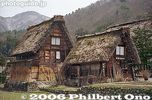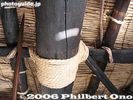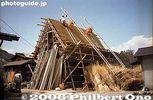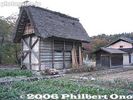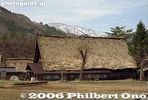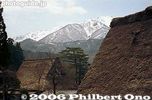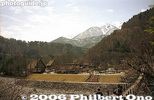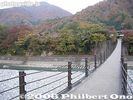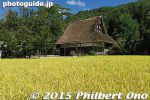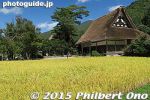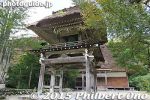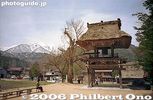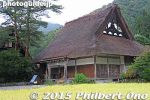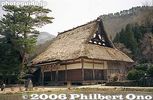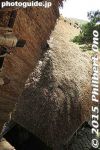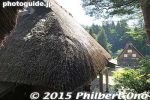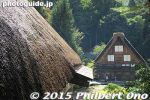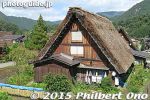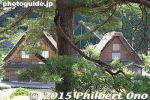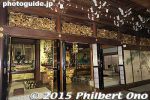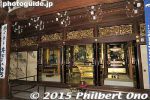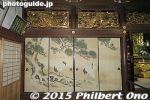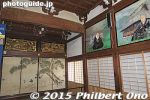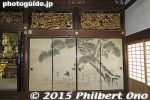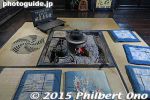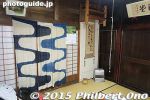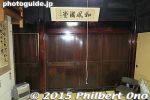 Image search results - "shirakawa-mura" Image search results - "shirakawa-mura" |

Bird's eye view of Shirakawa-go from Ogimachi Castle ruins.
|
|

Side view of Wada-ke House
|
|

Shirakawa-go is also a National Important Traditional Townscape Preservation District (重要伝統的建造物群保存地区).
|
|

Path to Wada House entrance
|
|

Close-up of Ogimachi
|
|

Main house on left and latrine on right with large vats to gather fertilizer.
|
|
|

Main house with a recently rethatched roof, making it look very smooth.
|
|

Shirakawa-go 白川郷
|
|

Wada House, Shirakawa-go
|
|
|
|
|
|

Gable openings let light and air come through the attic to foster silkworms.
|
|

A small stream beside the house helps to melt the snow falling off the roof.
|
|
|
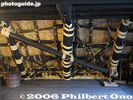
Underside of roof made of an A-frame truss structure
|
|

The thatched roof is replaced every 30 years. Every spring, 6 or 7 thatched roofs are replaced in Shirakawa-go.
|
|
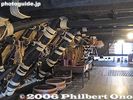
The bottom ends of these beams are pegged into a point (komajiri) resting on another cross beam. Wada House, Shirakawa-go
|
|

It costs several million yen and a small army of workers to replace the thatch. The cost is subsidized by the town, prefecture, and national government.
|
|

Where silkworms were raised to make silk cocoons.
|
|
|

Slats on the attic floor to enable smoke and soot from the hearth to reach the attic.
|
|
|
|
|

Straw rope tie the large beams to form a truss for the roof.
|
|
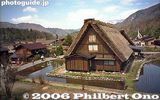
Shirakawa-go 白川郷
|
|
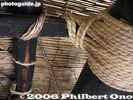
Another rope made of a crushed tree branch to tie smaller beams. It tightens as it dries.
|
|
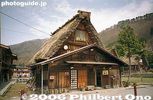
Photo gallery
|
|
|
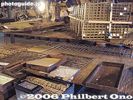
Implements to raise silkworms.
|
|

Restaurant
|
|
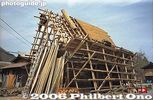
Rethatching a small storehouse.
|
|
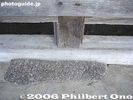
Foundation and pillars rest on stones. The beam is shaped to fit the stone.
|
|
|
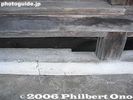
Two foundation beams interlock.
|
|
|
|

Thatch repair work.
|
|
|
|
|
|
|
|
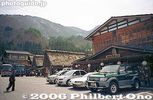
Tourist Information Office in the center of town.
|
|
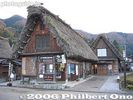
Tourist Information Office
|
|
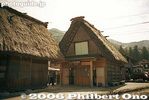
Restroom behind the Tourist Information Office
|
|
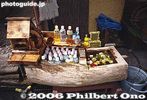
Cooling system
|
|

Parking lot along the main road through the village.
|
|

Deai Bridge crossing the Shokawa River.
|
|
|

Deai Bridge
|
|

Shokawa River
|
|
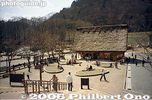
Tourist Info Office near the bus stop.
|
|
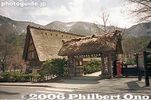
Entrance to the Gassho-zukuri Minka-en outdoor museum.
|
|
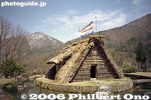
Gassho-zukuri Minka-en outdoor museum
|
|

Gassho-zukuri Minka-en outdoor museum
|
|
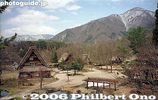
Gassho-zukuri minka houses slated for destruction were moved to this outdoor museum and saved.
|
|
|
|
|

Fire hydrant
|
|

Manhole in Shirakawa-go.
|
|

Shirakawa Village Office
|
|

Dam reservoir
|
|

Mihoro Dam, made only of rocks and clay. 131 meters high, 405 meters long.
|
|

Myozenji is a Buddhist temple of the Jodo Shinshu sect, the most common sect in Shirakawa-go.
|
|
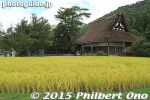
In autumn (Oct.), approaching rice harvest season.
|
|
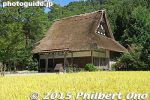
Myozenji's Hondo Main worship hall
|
|
|
|
|

Myozenji is the only temple in the gassho-zukuri style with a thatched roof. The Hondo worshp hall is the largest building in Shirakawa-go.
|
|
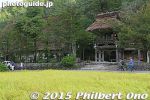
Myozenji's temple bell
|
|
|
|
|

Myozenji temple bell with thatched roof
|
|
|
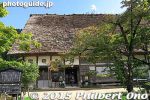
Enter Myozenji through this adjacent and adjoining building that is a museum and minister's residence.
|
|

Myozenji Temple Museum
|
|
|
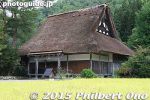
The Hondo worship hall can be entered through the adjoining building.
|
|
|
|

Myozenji Temple, Shirakawa-go
|
|
|

Myozenji Hondo worship hall.
|
|
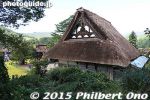
Side view of Hondo worship hall.
|
|

View of temple roof
|
|
|
|
|
|
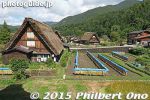
View from the upper floor of the temple museum.
|
|
|
|
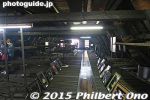
Inside the temple museum.
|
|
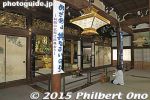
Inside the Myozenji temple Hondo worship hall. Tatami mats and looks like a typical Jodo Shinshu temple on the inside.
|
|
|
|
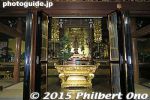
Buddhist altar of Myozenji
|
|
|
|
|
|
|
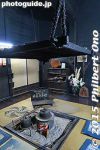
Irori hearth in Myozenji temple
|
|
|
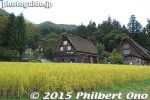
When you want to stay overnight in Shirakawa-go, it's hard to decide which minshuku (farmhouse lodge) to stay in. There's a good number of minshuku in Shirakawa-go.
|
|
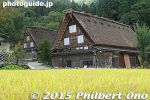
Most people go through an agent to book a room instead contacting individual minshuku to see if they have a room.These are two minshuku, Hisamatsu on the left and Furusato on the right. They are within walking distance from the bus stop.
|
|
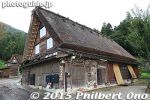
This is a minshuku in Shirakawa-go named Furusato where I stayed overnight. Looks very traditional on the outside and there are strict regulations on keeping it that way. ふるさと
|
|

Greetings in English by Furusato. ¥9,000 per night including a sumptuous breakfast and dinner.
|
|

I was surprised to see these pictures displayed inside Furusato. They showed Prince Hiro (currently the Crown Prince) who stayed at this minshuku while a college student.His brother Prince Aya/Akishino also stayed at this same minshuku when he was in college.
I was very surprised to hear from the proprietress that the Imperial Household Agency had designated the Furusato minshuku as *the* place to stay for Imperial family members visiting Shirakawa-go. She doesn't know exactly why. She says that although it was an honor to host the Princes, they can't really advertise it (the Imperial family can never be used for commercial purposes). She also lost money because they (her mother) had to buy new, fluffy futons, etc., just for the prince.
|
|
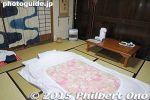
My room in Furusato. It was not the same room where the crown prince stayed.
|
|

My room
|
|
|
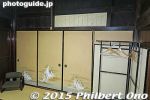
My room in Furusato.
|
|
|
|

Sink
|
|
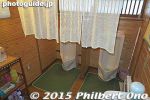
The restrooms are modern. I'm told this part of the house was for horses.
|
|
|
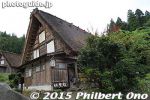
Next to Furusato is another minshuku named Hisamatsu in Shirakawa-go. Looks almost the same on the outside.
|
|
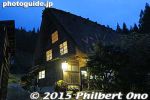
Hisamatsu at night.
|
|
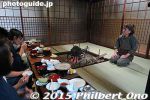
Dinner at Hisamatsu near the irori hearth while the friendly proprietress chatted with us. I asked her about the difficulty of having a successor to take over the minshuku.She said it was a common problem among the minshuku operators there and hoped that one of her daughters would take over. She explained the Three Golden Rules that they follow: Do not sell, do not rent, and do not destroy the farmhouse. They are trying to change the rule about "do not rent." Perhaps if they rent it, the owner family can have another family operate their lodge.
|
|
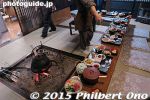
It costs 10 million yen to rethatch the roof. They do it once every 30 years. The thatch is Japanese pampas grass (susuki) from the base of Mt. Fuji.The rethatch cost is subsidized by the national government and municipality. So the family only pays one-third the cost of 10 million yen. In the old days, they had family and friends gather the thatch and the roof was rethatched by the villagers as a community project. Not anymore. They have to hire professionals to do it which cost a lot of money.
|
|

Irori hearth in Hisamatsu minshuku
|
|
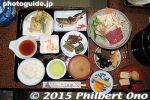
Dinner at Hisamatsu, Shirakawa-go. Includes Hida beef.
|
|
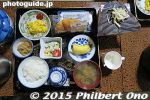
Breakfast at Hisamatsu, Shirakawa-go
|
|

Isaburo minshuku 民宿 伊三郎
|
|

Entrance to Isaburo
|
|
|

River next to the inn, mainly to carry away snow.
|
|

Dinner at Isaburo: River fish and mountain vegetables. After dinner, the proprietress and her husband and daughter sang and danced for us. They demonstrated different traditional musical instruments and had us try playing them. It was great. However, I was told that they don't do that anymore.
|
|
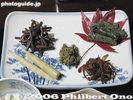
Mountain vegetables 山菜
|
|
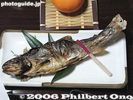
Grilled Iwana river fish
|
|
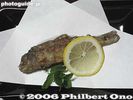
Fried Iwana, eat the head and all.
|
|
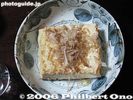
Tofu
|
|
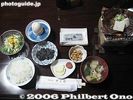
Breakfast at Isaburo minshuku
|
|

Otaya minshuku 民宿 太田屋
|
|

Due to a lack of thatch, only half of one side of Otaya's roof is newly thatched.
|
|

Inside Otaya
|
|
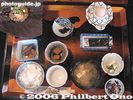
Breakfast at Otaya
|
|

Dinner
|
|
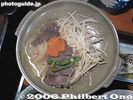
Hida beef
|
|
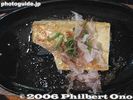
Tofu steak
|
|
|
|
























